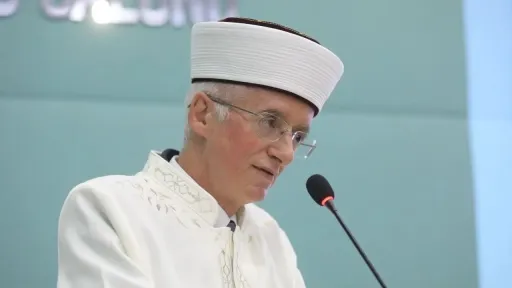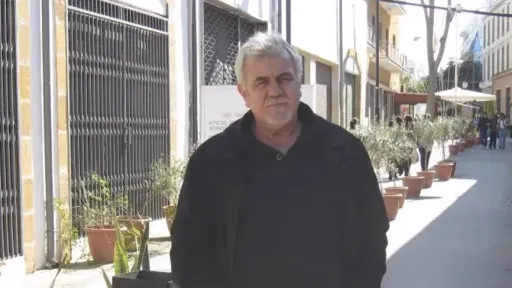Western Thrace Turks commemorate "January 29"

In Greece, Western Thrace Muslim Turks, who first took to the streets on January 29, 1988, and then on January 29, 1990, to react to the denial of minority rights acquired by international agreements, especially the denial of Turkish identity, and to make their voices heard against the injustices, commemorated the symbol of the ethnic resistance, January 29 with the events.
The example of social solidarity for national identity and minority rights was shown once more at the event organized by the Western Thrace Turkish Minority Advisory Board (BTTADK) in a hotel in Komotini where the ethnic resistance was written in history.
Due to the Social Solidarity and Ethnic Resistance Day of the Western Thrace Turkish Minority on Wednesday, January 29, 2020, people from all parts of Western Thrace participated in the event organized under the title "Turkish Presence in Western Thrace and January 29th".
The event, which took place on Wednesday evening at 18.30, started with the video show of the events on January 29. Later, the Head of the Advisory Board and Komotini Mufti İbrahim Şerif shared his memories of the events on 29 January in his opening speech.
İbrahim Şerif stated in his speech how the Minority came to these days after the junta period, the Turkish Minority lived a ghetto life in the 1970s, and the minority was deprived of many rights. Stating that the minority's suffering increases day by day and there are serious problems especially in the field of education, Şerif stated that some minority associations were closed in the following years. Şerif stated that the 29th of January had come as a result of these events and pressures and said, "29th of January incidents occurred like a knife based on the bone of our minority."
Then the first part of the session, moderated by Journalist Hülya Emin speaking of January 29, started. In the first session, Historian Özer Hatip from İzmir Katip Çelebi University Institute of Social Sciences, Head of Higher Graduates (BTAYTD) Dr. Hüseyin Baltacı and BAKEŞ General Manager Dr. Pervin Hayrullah made a speech and shared their thoughts on January 29 with the participants and answered the questions asked.
Speaking first in the first session, Historian Özer Hatip from the Social Sciences Institute of Izmir Katip Çelebi University emphasized that the denial of the education problem and ethnic identity was the most annoying part of the minority in the 1980s. Underlining that 1988 is a history that Western Thrace Turks should be proud of, Hatip said, “Western Thrace Turkish community has a deep and political history. The minority has never been out of democratic tolerance. The minority fought an extremely democratic struggle. The point reached came from the otherization of the minority”.
Later, BTAYTD President Hüseyin Baltacı took the floor. Giving examples of the moments they lived at that time, Baltacı said, “January 29 is a turning point for our minority. Perhaps the period has changed, but pressures are still ongoing. The events of January 29 have kept this love and our determination to live up to now, and continue to keep it alive today”.
Speaking at the last session, BAKEŞ General Manager Pervin Hayrullah stated that the Turkish presence in Greece is a historical reality and nobody can refuse it. Stating that opening up Turkish identity to discussion in Western Thrace is a completely guided political maneuver, Hayrullah stated that determining one's own identity is the most basic human right. "Western Thrace Turks are a wealth for Greece," said Pervin Hayrullah, who said that January 29 is the awakening of Western Thrace Turks. In the continuation of Hayrullah's speech, she cited how the events of January 29 took place in the international press by quotations and especially evaluated the Minority's perspective on these events. Finally, Hayrullah said, "The reality of January 29 should be transferred to the Minority with scientific data and reality".
In the second part of the session, Izmir Katip Çelebi University Vice President, attending the event from İzmir. Dr. Turan Gökçe spoke to Western Thracian citizens.
Prof. Dr. Gökçe In the first part of his speech shared his thoughts on January 29 and, after evaluating some points voiced by previous speakers, gave detailed information to the participants by mentioning the history of the Turkish presence in the Western Thrace region and the Balkans.
Gökçe, who said “January 29 is the resistance day of the Western Thrace Turks, it is the day of the struggle for existence”, continued as follows: “This date is the day when the knife rests on the bone in terms of Western Thrace Turks. 29 January is not only a case but also a resistance. With this spirit, Western Thrace Turks guaranteed its future existence in a way. As in yesterday, tomorrow will survive and live in this land with the same spirit. It will continue this existence with its own identity and its own values. On 29 January this spirit was revealed. What happened in 1988 strengthened the spirit of January 29 with their attitude towards the violent incidents experienced in 1990. Western Thrace Turks have demonstrated their existence in these lands and their determination that they can engage in any kind of struggle on January 29th. "
After the speakers at the end of the program, Mufti of İskeçe Ahmet Mete took the floor and greeted the citizens and shared his thoughts on January 29. Mete said in his speech: “Unlike not losing the spirit of January 29, it is necessary to live. I hope Allah, together with our state, let the peace unite with us”.
Advisory Board Chairman and Mufti of Gümülcine Ibrahim Serif presented a gift to those who attended the program at the end of the event as speakers from Turkey, Izmir Katip Celebi University Vice-President Prof. Dr. Turan Gökçe and Izmir Katip Çelebi University Social Sciences Institute Historian Özer Hatip who is a Western Thracian.
Turkey’s Komotini Consul General Murat Ömeroğlu, Western Thrace Turkish Minority Advisory Board Chairman and Komotini Mufti Ibrahim Sharif, Chairman of Friendship, Equality and Peace Party Cigdem Asafoğlu, Mufti of Xanthi Ahmet Mete, KINAL Deputy of Xanthi Burhan Baran, Arriana Mayor Ridvan Ahmet, Iasmos Mayor Önder Mümin, Mayor of Myki Rıdvan Deli Hüseyin, President of ÇINAR Association Cengiz Ömer, President of Western Thrace Turkish Teachers Union Aydın Ahmet, President of BAKEŞ Hüseyin Bostancı and General Manager Pervin Hayrullah, President of Komotini Turkish Youth Union Sedat Hasan, President of BİHLİMDER Mehmet Emin Ahmet, South-Evros Education Culture Association President Bekir Mustafaoğlu, President of Western Thrace Mosques Religion Officers Association Sadık Sadık, Eastern Macedonia and Thrace Regional Vice President Ahmet İbram, councilors Tarkan Multaza and Cihan İmamoğlu and citizens from all parts of Western Thrace attended the event.
January 29: Epic of "Ethnic Resistance" of Western Thrace Turks
On January 29, 1988, the Western Thrace Turkish Minority took to the streets with thousands of people to stop the Greek state's denial of national identity, anti-democratic practices, digestion, and assimilation policies and wrote the epic "Ethnic Resistance" by shouting its voice to the world.
What happened on January 29, 1988 in the process of the Ethnic Resistance that the minority wrote in history
It was a turning point in minority history that thousands of Turks in Western Thrace passed the Ethnic Resistance on January 29, 1988 and shouted the pressure and practices of the Greek state to the whole world. The spark that triggered the January 29 was the approval of the Greek Supreme Court of Appeals on 4 November 1987 to close the Western Thrace Turkish Teachers Union and the Komotini Turkish Youth Union. Although the decision from the Supreme Court came out on November 4, the decision only increased the reactions of the Western Thrace Turkish Minority, which got tired of the injustice when it was learned on January 5, 1988, and the Greek state "denied identity". The Minority High Council decided to organize a march from Komotini Old Mosque to the Governor's Mansion after Friday prayer on 29 January 1988, in order to protest the practices of the Greek state, which denies "Turkish identity" and to announce it to the world. This decision was also reported to state authorities. Greece did not allow this march and both in Greek and in Turkish was announced that the Turks were banned from gathering for the march from Komotini radio. However, the Western Thrace Turkish Minority was determined to announce the pressures of the Greek state to the world. For this reason, despite the ban on the radio, police barricades on the roads, thousands of Turkish Komotini flocked from İskeçe and Meriç. In order to stop the march, the Eski (Old) and Yeni (New) Mosque were closed for worship, however, police were added to Gümülcine from Kavala. The number of Turks who reached Komotini and got caught in police barricades at the city's entrances was close to 20 thousand. State officials asked for the demonstrators to disperse. Independent Deputy Ahmet Faikoğlu, after the speech he made to the crowd, the show turned into a walk with the news that some Turks were arrested by the police while the crowd started to disperse. Many minority individuals were beaten, subjected to violence and arrested during the march.
400 workplaces belonging to minority people were destroyed on 29 January 1990
Even though the Western Thrace Turkish Minority showed its reaction to the pressure of the Greek state and the digestion policies with the demonstrations in 1988, state policy did not change and continued its pressures. The Minority High Council decided to organize a religious event in the Eski Mosque on January 29, 1990 to commemorate what happened in January 1988. On January 28, when the minority's leaders tried to keep the public informed about the commemoration event, an unrelated news from Greek local radios spread. This news was that a Greek was killed by a Turk in the hospital. This was unreal news to completely block the January 29 commemoration event. Along with the news, the call of the Greeks-Maronia Church Metropolitan Damaskinos to the Greeks to prevent the event caused the events to grow. While the Turks gathered in the Eski Mosque for the event, the Greeks damaged the Turkish coffeehouses and shops with sticks in groups. Hearing the attacks, the Turks wanted to enter the Komotini Turkish Youth Union from the Eski Mosque to take shelter in, but the police did not allow it. On the one hand, the police prevented Turks from going to GTGB, and on the other hand, they ignored the damages to minority workplaces. Nearly 1000 attackers attacked 400 workplaces in the incidents and damaged them. Attacks on the minority workplace have caused major material damage.
Western Thrace Muslim Turkish Minority wrote a history on 29 January 1988 and 29 January 1990. In these events, the minority came shoulder to shoulder. The union united in the best way and tried to stop the Greek state. January 29, 1988 and January 29, 1990 were the days when the Western Thrace Turkish Minority symbolized the National Resistance. Although 32 years have passed since the incidents and the January 29s have been a minority turning point for the acquisition of rights, the minority has still not been able to obtain most of its rights except for some rights and the Greek state continues its antidemocratic practices without slowing down in many areas.


